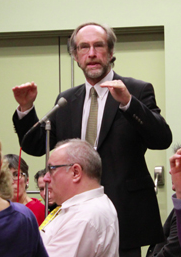Blog
Alcohol Use Costs New Hampshire More Than $1.15B Annually
- Details
- Created: Tuesday, January 29 2013 20:37
 A new study released by PolEcon Research has found that excessive alcohol consumption costs the state of New Hampshire more than $1.15 billion annually in lost productivity and earnings, increased expenses for healthcare, and public safety. These costs represent 2% of the total personal income of the state, and do not include another $218.6 million lost annually by the almost 300 people who die prematurely as the result of alcohol consumption each year in New Hampshire. The new data comes at a time when the state is considering an increase on its beer tax, a proposal that the beer industry is fighting tooth and nail. The state and local governments’ share of the costs of alcohol consumption is about $251 million annually, a figure that could be offset by an increase in the beer tax.
A new study released by PolEcon Research has found that excessive alcohol consumption costs the state of New Hampshire more than $1.15 billion annually in lost productivity and earnings, increased expenses for healthcare, and public safety. These costs represent 2% of the total personal income of the state, and do not include another $218.6 million lost annually by the almost 300 people who die prematurely as the result of alcohol consumption each year in New Hampshire. The new data comes at a time when the state is considering an increase on its beer tax, a proposal that the beer industry is fighting tooth and nail. The state and local governments’ share of the costs of alcohol consumption is about $251 million annually, a figure that could be offset by an increase in the beer tax.Minimum Alcohol Pricing in Canada Reduces Harm
- Details
- Created: Tuesday, January 29 2013 20:37

Take Action: Tell Jerry Brown to Adjust Alcohol Excise Tax
- Details
- Created: Wednesday, January 16 2013 20:37
Since 1991 Big Alcohol lobbying has resulted in California losing $1.8 billion in revenue. A simple inflation adjustment and a nickel a drink increase on beer and wine would generate an additional $641.7 million in 2013-2014, and $8.22 billion through 2023. Adjusting alcohol taxes is a sensible and fair way to address the State's looming budget deficit. Higher alcohol taxes are also sound public health policy. They are passed on to consumers, resulting in higher retail prices and reduced consumption. Reduced consumption will reduce the annual catastrophe of $38 billion in alcohol-related harm in California. It's time to tell California's elected leaders to stop the Big Alcohol subsidies, adjust the excise tax, increase revenues, and stem the tide of alcohol-related harm in the state.
More Articles ...
Subcategories
Help us hold Big Alcohol accountable for the harm its products cause.
| GET ACTION ALERTS AND eNEWS |
STAY CONNECTED    |
CONTACT US 24 Belvedere St. San Rafael, CA 94901 415-456-5692 |
SUPPORT US Terms of Service & Privacy Policy |



